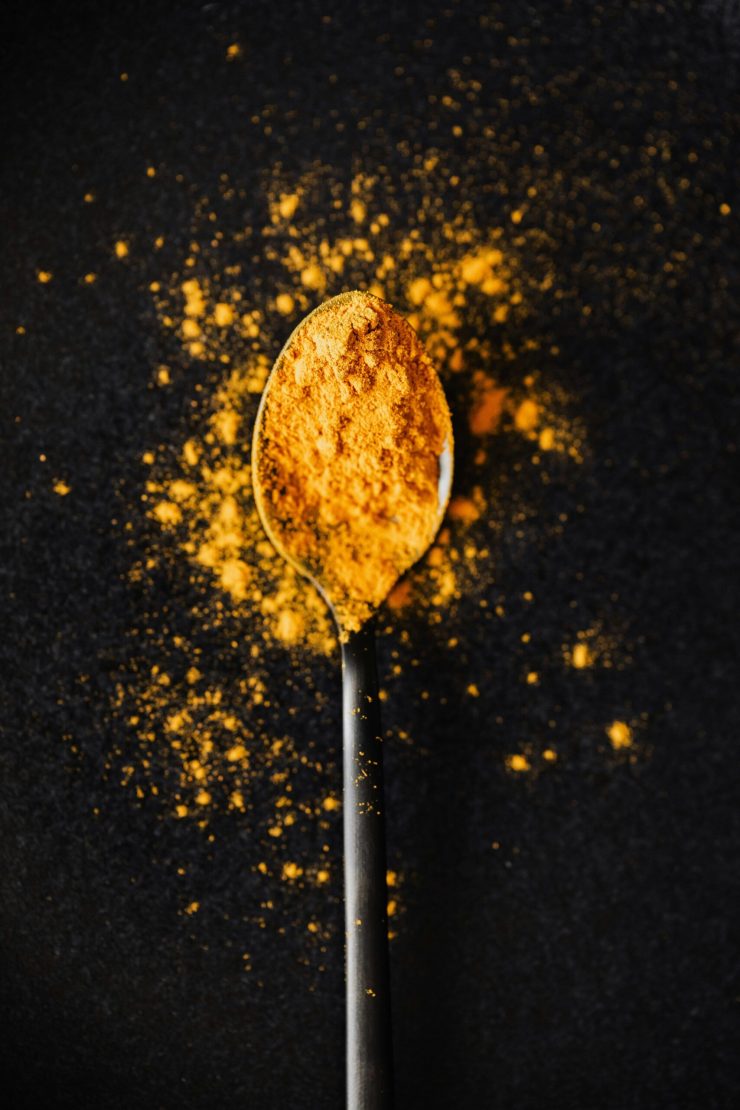
Turmeric, also known as Haldi in Indian households, has long been celebrated for its vibrant yellow color and healing properties. Whether used in curries, teas, or as a topical remedy, turmeric’s bioactive compound, curcumin, is the star that brings its impressive health benefits to the forefront. But how exactly does it work in the body, and what makes turmeric a powerful ally for your health? Let’s dive into the science behind this golden wonder!
🌟 The Bioactive Compound: Curcumin
The primary bioactive compound in turmeric is curcumin. It’s responsible for most of the health benefits we associate with this vibrant root, from its anti-inflammatory properties to its antioxidant effects.
Curcumin is a polyphenol that has been shown to have anti-inflammatory, antioxidant, antimicrobial, and anticancer effects. It works by inhibiting molecules involved in inflammation pathways, such as cyclooxygenase-2 (COX-2) and nuclear factor kappa-B (NF-κB), both of which are key drivers of chronic inflammation in the body.
🧬 Curcumin Absorption: Why It Needs a Boost
Despite its powerful effects, curcumin is poorly absorbed by the body when consumed on its own. Studies show that only about 1% of curcumin from turmeric reaches your bloodstream due to its low bioavailability. This means that even though you’re consuming turmeric regularly, your body may not be fully reaping its benefits unless it’s properly absorbed.
Here are a few ways you can enhance curcumin absorption:
- Black Pepper: Adding black pepper to turmeric is one of the simplest and most effective ways to increase curcumin absorption. Piperine, a compound found in black pepper, can increase curcumin absorption by up to 2000% (Shoba et al., 1998).
- Fat: Curcumin is fat-soluble, meaning it dissolves better in fat. Consuming turmeric with a source of healthy fat like olive oil or coconut oil can significantly improve its absorption.
- Heat: Light heating or cooking turmeric with oil can also make it more bioavailable, which is why it’s so effective in cooking!
🍽️ Turmeric for Digestion: A Natural Aid
One of the most well-known benefits of turmeric is its positive impact on digestion. In traditional medicine, it has been used for centuries as a remedy for various digestive issues, from bloating to indigestion. Let’s explore how turmeric aids in digestion:
🔥 Stimulating Bile Production
Turmeric has been shown to stimulate the production of bile, a digestive fluid produced by the liver that helps break down fats in the small intestine. This makes turmeric beneficial for people with gallbladder issues and those experiencing bloating or difficulty digesting fats.
🌱 Promoting Gut Health
Curcumin also has anti-inflammatory effects on the digestive tract. Studies have found that it may help soothe the gut lining and reduce symptoms of irritable bowel syndrome (IBS), gastritis, and ulcers. It works by modulating inflammation in the gut and supporting healthy gut microbiota.
💪 Relieving Flatulence and Gas
Turmeric’s carminative properties (which means it helps to relieve gas) help reduce the buildup of gas in the intestines, making it a go-to remedy for people suffering from uncomfortable bloating or flatulence.
💊 Dosage of Turmeric: How Much Is Enough?
While turmeric is widely used in cooking, curcumin doses required for therapeutic benefits are often higher than what we typically consume through food alone. Here’s a breakdown of the recommended dosage:
📊 Recommended Dosage:
- For general health: 500-1,000 mg of curcumin per day (in supplement form) is often recommended.
- For therapeutic purposes: Higher doses of 1,000-2,000 mg per day may be beneficial, especially for conditions related to inflammation or joint health.
🍽️ Using Turmeric in Food:
Adding turmeric to your daily diet through curries, teas, soups, or golden milk (turmeric latte) is a great way to reap its benefits in a more natural form. While you won’t get the same high dose as a supplement, incorporating turmeric regularly can still provide positive health effects.
Note: Always consult with a healthcare provider before taking high-dose curcumin supplements, especially if you are on medication for blood thinning or gallbladder issues.
🔬 Scientific References:
- Shoba, G., Joy, D., Joseph, T., MacDonald, J., & Majeed, M. (1998). “Influence of piperine on the pharmacokinetics of curcumin in animals and human volunteers.” Planta Medica, 64(4), 353-356. Link to study
- Jurenka, J. S. (2009). “Anti-inflammatory effects of curcumin: A review of the literature.” Alternative Medicine Review, 14(2), 141-153. Link to study
- Kato, T., & Kiso, Y. (2008). “Turmeric and its bioactive compound curcumin as potential therapeutic agents for digestive disorders.” Journal of Clinical Biochemistry and Nutrition, 42(1), 1-9. Link to study
🌟 Conclusion
Turmeric (Haldi) is not just a vibrant kitchen staple but a powerhouse of health benefits, thanks to its key bioactive compound, curcumin. From its ability to reduce inflammation and aid digestion to boosting brain health and immunity, turmeric is truly a goldmine for natural wellness. To maximize its potential, pair it with black pepper, consume it with fat, or use it in various recipes throughout the day. Whether you take it in food, tea, or as a supplement, incorporating turmeric into your daily routine can significantly enhance your overall health and well-being.









